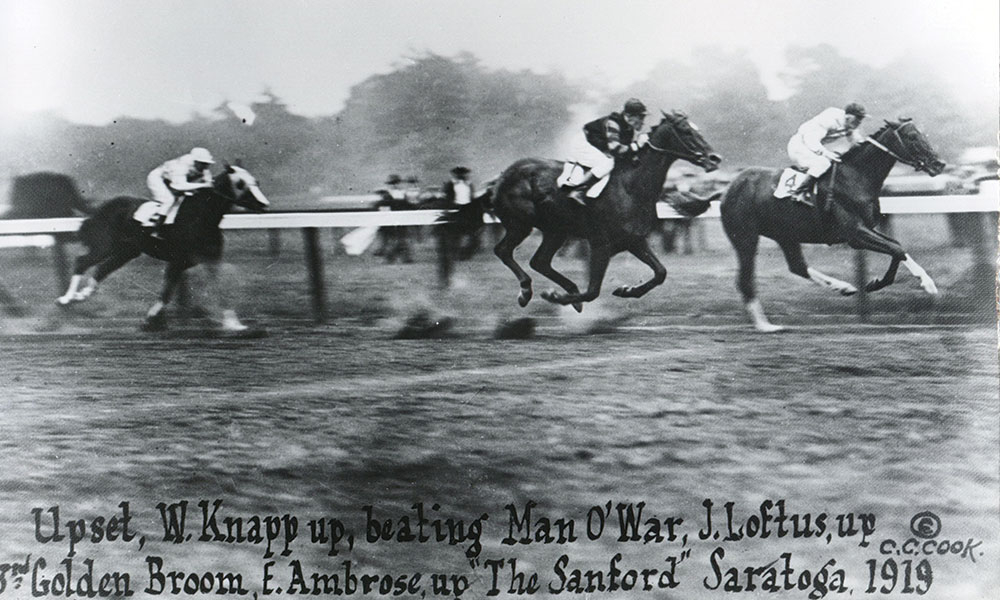Occasionally, when I’m researching horse racing history, I come across conflicting accounts of famous events. Separating fact from fiction can often prove difficult, because some of horse racing’s greatest stories have become exaggerated and romanticized over time, and that “fictional” account has become the official story. One such infamous race—
that in which Man o’ War lost the only race in his star-studded career—deserves a fresh set of eyes a century later.
Considered by many historians to be the greatest racehorse of them all, Man o’ War put together an illustrious 21-start career. And his one loss took place 100 summers ago at Saratoga Race Course, an astonishing result that significantly contributed to the popular mythology of the track being a “graveyard of favorites.” There’s been a century’s worth of conjecture surrounding the landmark event, but what can’t be disputed is the fact that Man o’ War crossed the finish line a diminishing half-length behind Harry Payne Whitney’s Upset in the Sanford Memorial Stakes on August 13, 1919. For the only time in his career, the mighty Man o’ War tasted the bitterness of defeat.
Although it was still early in his career, Man o’ War was already being hailed as a wonder horse by the press that summer. His numerous headlines in newspapers throughout the country rivaled those of era icons Babe Ruth and Jack Dempsey. Eleven days before the infamous running of the Sanford, Man o’ War pushed his record to six wins without a loss by taking the United States Hotel Stakes in his Saratoga debut, while carrying 130 pounds. Upset finished second. Man o’ War was again saddled with 130 pounds in the Sanford, 15 more than Upset, and was an 11-20 favorite to make it seven in a row.

What actually happened in the Sanford has been marred by the passage of time, differing contemporary accounts and even race-fixing speculation. One element of the story that has generally been agreed upon is that a substitute starter, C.H. Pettingill, had trouble maintaining order and struggled to line up the field prior to the race. This was in the era before the starting gate, and the horses were positioned behind a flimsy, webbed barrier. After several false starts, Pettingill finally dropped the starter’s flag. Man o’ War, who had drawn next to the outside, lost valuable ground early. Some reports said he was sideways at the start; others, that he was completely facing the wrong way.
Man o’ War’s jockey, Johnny Loftus, was also criticized for his role in the lone defeat. Scrambling to make up the early lost ground, Loftus took his mount to the inside but was pocketed along the rail. The rider eventually made another questionable maneuver, falling back to escape the wall of horses that had him pinned inside. Man o’ War was then guided back outside and finally found running daylight. Once in top gear, he came charging through the stretch like a freight train, but there was simply too much ground to overcome and his grand effort was in vain. At the finish, Upset lived up to his name and the large Spa crowd was left in disbelief. Placing the blame of the result squarely on Loftus, The Thoroughbred Record didn’t pull any punches, commenting that Man o’ War was “abominably ridden.”
Ten days later, again at Saratoga, Man o’ War shrugged off the Sanford result and easily defeated Upset in the Grand Union Hotel Stakes. A week after that, he romped in the Hopeful Stakes by four lengths on Saratoga’s Closing Day. Providing ammunition to conspiracy theorists, Loftus and Upset’s jockey, Willie Knapp, were both denied licenses in 1920 by The Jockey Club and never rode again. No explanation was ever given for the blackballing, leading many to speculate that the riders had somehow conspired to hijack the Sanford. Both Loftus and Knapp denied the implications to their graves.
Man o’ War went on to win all 11 of his races as a 3 year old in 1920, including a record-setting victory in the Travers Stakes. Upset, meanwhile, did little of note during the remainder of his career. But what a moment in the sun he had on the grand Saratoga stage a century ago! I can’t help but root for the underdog from time to time. That’s what horse racing’s all about.


